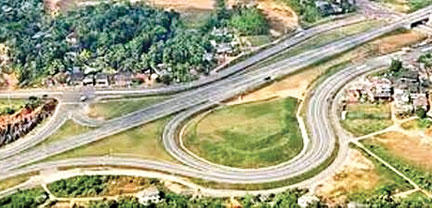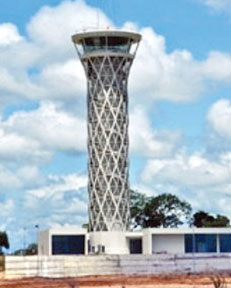Progress positive despite challenges - CB Governor
By Shirajiv Sirimane in New York
The Sri Lanka's political stability had being one of the key pillars
of success towards maintaining a robust economy, said Governor of the
Central Bank Ajith Nivard Cabraal.
Speaking at the Invest Sri Lanka - Investor Forum, J.W. Marriott
Essex House Hotel in New York on the subject of Economic Outlook he said
that due to this economic targets are set by the government and they
work hard to achieve them. "In addition in the recent past elections are
held at the right time ensuring that democracy is being maintained and
it is still the people that elect leaders.
"Due to President Mahinda Rajapaksa being a leader who keeps his
political promises people have faith in him and re-elect not only him
but the ruling party as well in provincial elections. "To obtain the
people's mandate fresh proposals (Mahinda Chintana) have to be put to
the people and these are ones that we implement successfully," he said.
"By 2015 we can move to 4,000 Dollar per-capita income, one year
earlier than we intended to. We started talking about per-capita income
at 4000, when our per-capita income was only at 1200. We wanted to
leapfrog and go to the next phase and we succeeded in doing that."
He said that the country has invested over US $ 3.5 billion since
ending of hostilities in 2009 to redevelop the North which clearly shows
the direction of the government.
Movement
"I feel the past eight years of Sri Lanka was a very interesting
period where we moved and transited from a conflict driven country to a
stable political and socially stable country, which has been an
extraordinary movement considering the challenges that we faced.
"The real sector of the country, the GDP sector has been strong and
the growth has been about 7.5 percent on average which has been
extraordinary growth momentum. Unemployment has come down, inflation has
been in mid-single digits in the past 66 months, then in the external
sector we see the current account deficit coming down, tourist arrivals
have been very strong."
|

Southern highway |
In 1982, just prior to the war against terrorism, Sri Lanka had
500,000 tourists visiting the country and at that time Thailand had one
million, double of what Sri Lanka had.
"With the ending of the conflict in 2009, Sri Lanka had 400, 000
tourists and Thailand had 20 Million, you can see what we had missed out
on. But that does not worry us too much because we know the capacity
that we have."
"The trajectory has been very strong and we have the potential to
have 1.6 Million tourists by the end of the year. By 2016 we will have
about 2.5 Million tourists visiting Sri Lanka and about 4.4 Million in
2020 - these are not just numbers we are working towards these goals
with a sense of eagerness and with the infrastructure being developed
accordingly."
FDI inflows have been strong, just in 2000 we had only about 200
million dollars coming into the country, but today we have two billion
dollars coming into the country each year and probably increasing as we
go on. Our gross official reserves have remained strong. It is in the
region of about nine billion dollars now and the Exchange rate has been
pretty stable.
Since our liberalisation in 1977, Sri Lanka has followed the
traditional IMF prescriptions, where we used to be told, if you
depreciate the currency all will be well and we depreciated at 9.9
percent from 1977 up until 2005. We thereafter changed that and brought
in a new type of economic management and from the year 2006 to 2012, it
has only depreciated by 3.3 percent; one-third of what we had had in the
past in that period of time. This year we have seen a gentle
appreciation of the currency and we are not too eager to make it too
expensive for people, he said.
Deal
|

Mattala airport |
The fiscal consolidation has helped a great deal, the government has
helped us manage inflation, so we cannot take credit for it ourselves.
We have been able to bring down the fiscal deficit as well as the public
debt. In 2002, Sri Lanka had a debt to GDP ratio of 105 percent and in
2005 at the time that this administration took office, it was as high as
91 percent and today it is down to 74 percent by the end of this year
and we will hit 65 percent by the end of 2016. This too has not been a
process that was too fast but a gentle reduction to take it forward on
the same sustainable lines.
"We are working to maintain a high growth and low inflation
trajectory and we are very keen to ensure that this continues. This is
an important facet of economic management because it gives us the
intention as well as the purpose to go towards that level of high growth
and low inflation. It was earlier mentioned that when governments stay
in power for too long they get complacent; but it is important to also
note the method in which governments are attacking these issues.
"Therefore, in the recent past, this government along with the
Central Bank and other economic planners have been focused in delivering
the numbers."
Growth
During the past few years we have been able to turn Sri Lanka into a
virtuous cycle and this is an important element for economic stability.
Very often if you get into a vicious cycle; it is very difficult for you
to get out of it. What was needed for Sri Lanka in 2006 and 2007 was to
break free from this vicious cycle and get into a new cycle, which is a
helpful cycle.
Because once you get into it, it helps you to keep going on the same
basis. Each of the items in a virtuous cycle, from low inflation to real
interest rates to enhanced savings to a regular pipe-line of
investments, sustained growth leading to low debt levels, leading to low
fiscal deficits, one again leading to low inflation is a good cycle to
be in and that is what we are very keen to do.
"Sri Lanka has great plans for 2020. We will target a GDP of around
150 billion, a per-capita of more than 7500 USD and to achieve that we
will need to have economic growth at around 8 per-cent, inflation at
current levels, poverty to reduce to low levels of around the less than
one percent mark, we are looking at a debt to GDP level around the 50
percent mark, current account to be at surplus and the Sri Lankan Rupee
to be at a slightly higher level, but not to be too expensive for
people.
"We are looking at a highly developed business outlook, making sure
that our ratings are improved on a consistent basis and ensuring that
the lagging behind of the other districts, to ensure that those areas
that were under conflict for thirty years today will not be recognised,
since all reconstruction efforts have been completed.
"We will have a shift in the real economy where the areas that were
thus far not in our lexicon coming in. particularly the five hubs; we
realised that we need to do something different, because many countries
have been in the middle-income trap."
Therefore, in 2010 we identified 5 key areas that we would develop;
maritime, taking advantage of the location of the country, aviation
again taking advantage of the location of the country, knowledge hub
where we would train our young people, today you will be surprised to
know that the London Stock Exchange is powered out of Colombo.
Energy sector
"The energy sector, Sri Lanka today is searching for oil, there have
been very impressive accounts of what we have in store and a commercial
hub - today if you go to Sri Lanka you will see that the roads are
improving and we have a new Sri Lanka. By seeing these areas of focus
change and improve we will see this paradigm shift in the real economy."
Dr. Sarath Amunugama, Senior Minister for International Monetary
Cooperation, and Deputy Minister of Finance and Planning who made the
welcome address said that the general perception is that Sri Lanka are
most dependent on Chinese funds, but you must remember that the whole of
Asia is demanding money for infrastructure.
"If you go to ADB or WB meetings you will see that the demand for
funds is for infrastructure projects. However we don't depend only on
China, we get a lot of multilateral investment, money from ADB and the
WB and Sri Lanka would welcome very much American investment in
infrastructure. In a few years there will be a surge of investment in
India, from the west and from there it will be a very simple matter of
extending that activity to Sri Lanka.
Education
"We have had a huge investment in ports and airports, on roads, a big
investment in education. When it comes to the funding for infrastructure
development, Sri Lanka has been very successful in finding the resources
necessary for infrastructure development. In Sri Lanka we take this for
granted but in the developing world it is a very difficult task to get
the funding necessary for what is called "shovel ready projects.
"There are many countries in our region who have been waiting for 5,
8 and even 20 years to get the funding for their infrastructure
projects. For example the Padma Bridge in Bangladesh, they have been
struggling for 10 years to get funding."
No institution will fund infrastructure, if they don't have the
confidence that this country will grow, will earn and will be able to
pay back these loans. This is a very important area, which adds to the
confidence that is in Sri Lanka.
Dr. Palitha Kohona, Permanent Representative of Sri Lanka to the
United Nations who made the welcome address said that perceptions of Sri
Lanka, in the United States have changed very certainly. "There are a
number of reasons for this, the first one is that Sri Lanka is far away
from the US radar and people don't pay much attention to Sri Lanka.
"The result is that most people depend on the newspaper headlines.
There are also certain vested interests that used the terrorist conflict
to paint a negative picture of Sri Lanka; given this background the
perceptions in this country (USA) may have taken a little longer to
change than the perceptions anywhere else in the world. If you take
Australia and New Zealand, they have a very positive perception of Sri
Lanka." |

